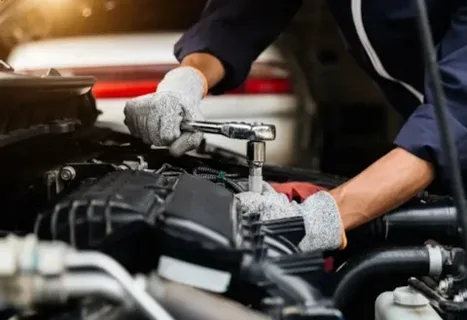Every car owner knows that repairs are an inevitable part of vehicle ownership. Whether it’s routine maintenance, fixing a strange noise, or restoring your car after an accident, how you approach the repair process makes a huge difference in cost, safety, and long-term performance. While it’s tempting to rush the process or pick the first repair shop that offers a low price, taking the time to make informed decisions can save you from frustration and unnecessary expenses later.
Understanding what to consider when having your car repaired helps you protect your investment and ensures your vehicle remains reliable for years. Here’s what every car owner should keep in mind before handing over their keys.
Understanding the Nature of the Problem
Before you bring your car to a mechanic, it helps to have at least a basic understanding of what might be wrong. Listen for unusual sounds, check if warning lights are on, and take note of any changes in how your car drives. The more specific you are when describing symptoms, the easier it will be for a technician to diagnose the issue accurately.
You don’t need to know the technical terms—just clear observations. For example, instead of saying “the car feels weird,” mention that “it pulls to the right when braking” or “it hesitates when accelerating.” This kind of detail can prevent misdiagnosis and ensure the repair shop focuses on the real issue from the start.
Having some awareness of the problem also protects you from being overcharged for unnecessary repairs. When you understand what might be going on, you can ask better questions and make more confident decisions.
Choosing the Right Repair Shop
Where you take your car is just as important as what’s being repaired. Not all auto repair shops offer the same level of expertise, service, or transparency. Look for a repair center with certified technicians, a good reputation, and clear communication.
Check online reviews or ask for recommendations from friends and family. A trusted local shop with a track record of honest work, like Husker Automotive, is often a better choice than a random garage offering steep discounts. Price should never be the only deciding factor—experience, honesty, and reliability matter much more in the long run.
Also, check if the shop specializes in your vehicle’s make and model. Cars today are complex machines with computer systems and specialized components, and working with a technician familiar with your brand can ensure a more accurate and efficient repair.
Asking the Right Questions
When you visit a repair shop, don’t hesitate to ask questions. In fact, asking the right ones shows that you care about your car and helps you understand what’s happening under the hood. Ask what the problem is, what caused it, and how the repair will fix it. Inquire about how long the repair will take, what parts will be used, and whether those parts are new, used, or aftermarket.
Transparency is key. A reputable repair shop will explain everything clearly, provide an estimate in writing, and walk you through the details before starting any work. If something sounds confusing or vague, don’t be afraid to ask for clarification. The best technicians respect informed customers and value open communication.
Evaluating Costs and Estimates
Cost is often the most stressful part of car repairs. However, a higher price doesn’t always mean better service, and a cheaper one doesn’t necessarily mean savings. The key is understanding what you’re paying for.
A good repair shop provides a detailed estimate that breaks down labor, parts, and additional charges. Be cautious of vague quotes that lack explanation. It’s also wise to compare estimates from a few shops to get a sense of the average price range, but remember that the cheapest option isn’t always the best.
Look for transparency in pricing—no hidden fees or last-minute add-ons. If a repair shop is upfront about their rates and willing to explain each item, that’s a strong sign of professionalism and honesty.
Checking for Warranty and Service Guarantees
Before agreeing to any repair, ask if the work comes with a warranty. Quality repair shops often stand by their craftsmanship and offer warranties on both parts and labor. This means if the same problem occurs shortly after the repair, they’ll fix it at no additional cost within the warranty period.
Understanding the warranty terms helps protect your investment and ensures you’re not left paying twice for the same issue. It also shows that the shop is confident in the quality of its work, which is always a positive sign.
Quality of Parts Used
Not all car parts are created equal. Some repair shops may use cheaper components to cut costs, which can affect performance and durability. Always ask what type of parts will be used—original equipment manufacturer (OEM) parts are designed to match your vehicle’s specifications and usually offer the best quality.
Aftermarket parts can be a good option if they come from trusted brands, but poorly made components may wear out faster and cost you more in the long run. A reputable repair shop will be transparent about the parts they use and explain your options based on budget and quality preferences.
Communication Throughout the Process
Good communication doesn’t end once you leave your car at the shop. A professional repair service will keep you updated throughout the process—especially if they discover additional issues or delays.
If a mechanic recommends additional repairs, ask whether they’re urgent or can wait. This helps you prioritize what’s necessary for safety versus what can be scheduled for later. A trustworthy technician will always respect your budget and timeline while giving honest recommendations.
Inspecting the Work Before You Leave
Before driving away, take a few moments to inspect your car. Check that everything feels right—the engine sounds normal, there are no warning lights, and the problem that brought you in has been resolved.
If the repair involved visible parts, look for clean, professional workmanship. Review the invoice carefully and make sure all agreed-upon repairs are listed accurately. Keeping a copy of your receipts and warranty details is also important for future reference.
Conclusion
Car repairs can be stressful, but making informed decisions can turn the experience into one of confidence and control. Understanding the problem, choosing a reputable shop, asking the right questions, and ensuring transparency in pricing and service all contribute to a smoother and more reliable repair process.
Whether it’s routine maintenance or a complex mechanical issue, the key is trust—trust in the professionals you choose and trust in your own ability to make the right call. By considering all these factors, you ensure that your car remains in top condition and continues to serve you safely for years to come.
Your vehicle is more than just a machine—it’s a part of your daily life. Treating it with care, and choosing the right professionals to repair it, makes all the difference on the road ahead.


